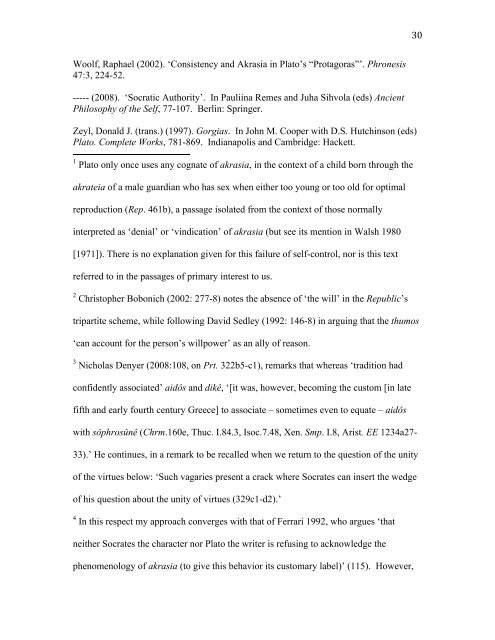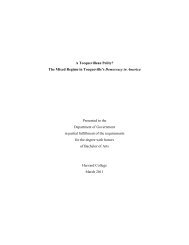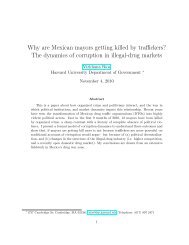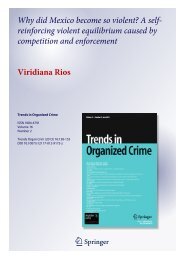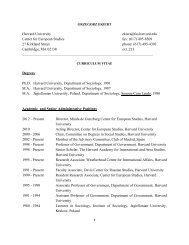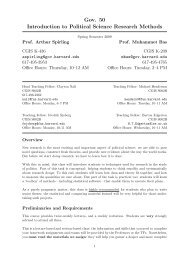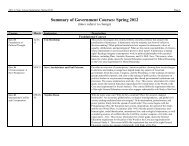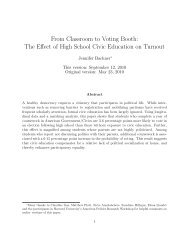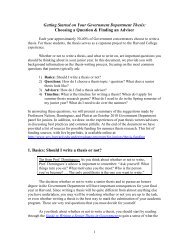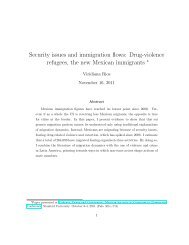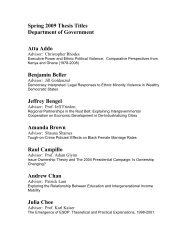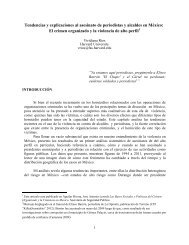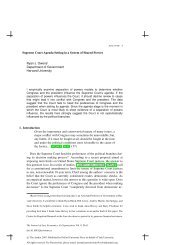1 Harvard University Political Theory Colloquium For 11 March 2010 ...
1 Harvard University Political Theory Colloquium For 11 March 2010 ...
1 Harvard University Political Theory Colloquium For 11 March 2010 ...
Create successful ePaper yourself
Turn your PDF publications into a flip-book with our unique Google optimized e-Paper software.
30 <br />
Woolf, Raphael (2002). ‘Consistency and Akrasia in Plato’s “Protagoras”’. Phronesis<br />
47:3, 224-52.<br />
----- (2008). ‘Socratic Authority’. In Pauliina Remes and Juha Sihvola (eds) Ancient<br />
Philosophy of the Self, 77-107. Berlin: Springer.<br />
Zeyl, Donald J. (trans.) (1997). Gorgias. In John M. Cooper with D.S. Hutchinson (eds)<br />
Plato. Complete Works, 781-869. Indianapolis and Cambridge: Hackett.<br />
<br />
1 Plato only once uses any cognate of akrasia, in the context of a child born through the<br />
akrateia of a male guardian who has sex when either too young or too old for optimal<br />
reproduction (Rep. 461b), a passage isolated from the context of those normally<br />
interpreted as ‘denial’ or ‘vindication’ of akrasia (but see its mention in Walsh 1980<br />
[1971]). There is no explanation given for this failure of self-control, nor is this text<br />
referred to in the passages of primary interest to us.<br />
2 Christopher Bobonich (2002: 277-8) notes the absence of ‘the will’ in the Republic’s<br />
tripartite scheme, while following David Sedley (1992: 146-8) in arguing that the thumos<br />
‘can account for the person’s willpower’ as an ally of reason.<br />
3 Nicholas Denyer (2008:108, on Prt. 322b5-c1), remarks that whereas ‘tradition had<br />
confidently associated’ aidôs and dikê, ‘[it was, however, becoming the custom [in late<br />
fifth and early fourth century Greece] to associate – sometimes even to equate – aidôs<br />
with sôphrosûnê (Chrm.160e, Thuc. I.84.3, Isoc.7.48, Xen. Smp. I.8, Arist. EE 1234a27-<br />
33).’ He continues, in a remark to be recalled when we return to the question of the unity<br />
of the virtues below: ‘Such vagaries present a crack where Socrates can insert the wedge<br />
of his question about the unity of virtues (329c1-d2).’<br />
4 In this respect my approach converges with that of Ferrari 1992, who argues ‘that<br />
neither Socrates the character nor Plato the writer is refusing to acknowledge the<br />
phenomenology of akrasia (to give this behavior its customary label)’ (<strong>11</strong>5). However,


